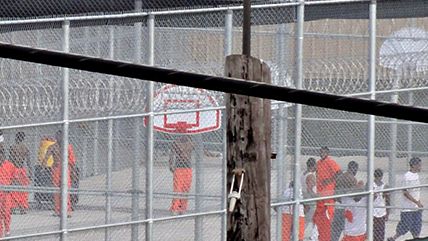Trump Can Help Stop Prison Rape
Will Jeff Sessions use his new power to enforce a bill he co-sponsored?

During the lame duck session in December, Congress did something amazing: It actually passed a criminal justice bill. Tucked among the provisions of the bipartisan law were new state reporting requirements on prison rape. While that's great, there's a lot more that could be done if the federal government is serious about stopping this heinous crime.
Back in 2003, Republican Sen. Jeff Sessions worked across the aisle with Democrat Sen. Ted Kennedy to pass the Prison Rape Elimination Act (PREA). Evangelical Christians, led by Chuck Colson—the former Watergate conspirator who turned to prison ministry after his own stint on the inside—were instrumental in whipping GOP support. But the Justice Department didn't adopt national PREA standards until 2012. Four years after they went into effect, the Associated Press reported that only 12 states were in full compliance with them.
A nationwide inmate survey by the Bureau of Justice Statistics found that in 2011–12 an estimated 4 percent of state and federal prison inmates and 3.2 percent of jail inmates reported being sexually victimized by another inmate or a member of the staff. In 2013, Eli Lehrer wrote at National Review that "PREA has reasonably few real teeth and, as a result, truly awful prisons and jails can still get away with allowing rampant sexual abuse. Cultural attitudes towards prison rape, distressingly, haven't changed much."
One major requirement of the law is that juveniles and other vulnerable inmates be segregated from the general adult population. This is a logistical headache for prisons and jails, especially ones in states that can try juveniles as adults, and the official consequences for failure to comply are rather minor. Under PREA, states risk losing 5 percent of their federal prison grants for noncompliance. Governors of those states are required to submit letters to the Justice Department demonstrating how they are using federal funds to bring their prisons in line. County and local jails are, by and large, not covered by the law at all.
Sessions is now Donald Trump's pick for U.S. Attorney General. If confirmed, he'll have authority over the entire federal Bureau of Prisons system. Will he use his power to enforce the bill he co-sponsored?
Improving federal oversight of state prisons' efforts to stop rape, and strictly enforcing the current standards in federal prisons and immigrant detention centers, are two areas where the new administration and GOP-led Congress could make bipartisan, good-faith progress on criminal justice.
Liberals, conservatives, and libertarians all agree that prison rape is a gross violation of inmates' human dignity and an unacceptable stain on the U.S. justice system. Congress has already shown twice that the two parties can work together on it. It's time to give PREA teeth.
This article originally appeared in print under the headline "Trump Can Help Stop Prison Rape."


Show Comments (36)